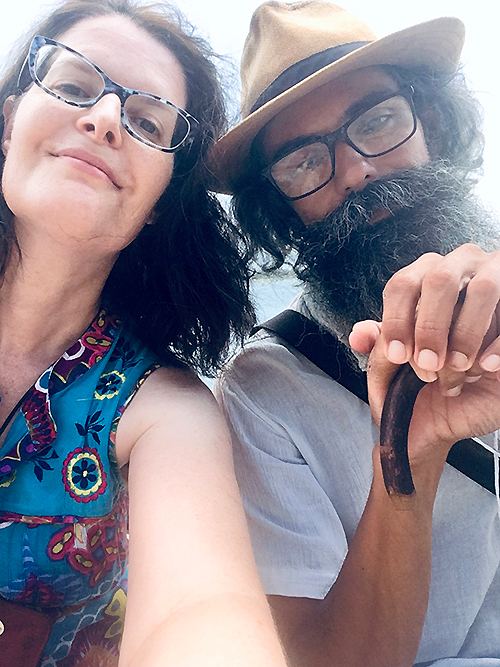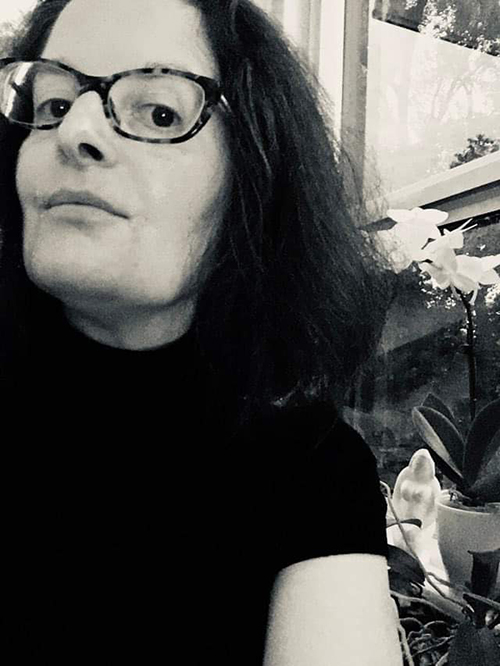For PhD candidate Catia Dignard, music has proven to be the universal language that has led to valuable avenues for her research, not to mention meaningful friendships.
Originally from Montreal, Dignard is an accomplished jazz and folk singer-songwriter who has been writing, recording and performing since the early 2000s.
At U of T, Dignard is completing her dissertation with the Faculty of Arts & Science’s Department of Spanish & Portuguese. She’s examining linguistic representations of racialized voices in contemporary Cuban fiction and how they reflect evolving notions of nationhood, class and race relations on the island.
“This is like a second career — I came back to what I love most, literature, music and culture,” says Dignard, who taught economics in Quebec’s CEGEP post-secondary system for close to two decades.

Photo courtesy of Catia Dignard.
During that time, she coordinated and participated in several student solidarity work projects and cultural exchanges, including annual trips to Nicaragua and Cuba, where she taught a course on Arts, Culture and Cuban Society, perfecting her Spanish along the way. Immersing herself in Cuban culture, she also forged a deep connection with the people and the music.
“My economics background helped me understand the socio-economic dimensions of the country and how it influences literature, art and music,” she says. “I also met plenty of authors whose work I'm now analyzing.”
That analysis involves researching the linguistic styles of authors spanning colonial times to the present, examining the dialogue and speech patterns of Black characters, which according to Dignard, differ greatly compared to white characters.
“Is it a narrative strategy that reinforces discrimination?” asks Dignard. “Or is it simply a way of being realistic when giving voice to the people that live in different socio-economic contexts?”
In Cuban poetry of certain periods, Dignard found this emphasis on Cuban vernacular and the inclusion of Afro-Cuban orality to be more celebratory in nature. “It was a way to show that Cuba also had African heritage,” she says. “It's all linked to the evolution of what it is to be Cuban, what it is to be part of that nation.”
So what is it about Cuban culture that she loves?
“Cuban culture is very nuanced,” she says. “Of course there are social issues, but at the same time, it's very rich, and Cubans have this way of living through hardship. They are very resilient, very inventive and very helpful, in spite of it all.
“During my trips to Cuba, I developed friendships. The more I got interested in their culture and their literature, the more they wanted to help me in my research. It's a place where I easily feel at home.”
She’s also been embraced by Cuba because of her love of music.
When she started her music career, she was primarily performing jazz standards. “And then at a certain point, I decided I wanted to write my own songs,” she says.
That led to her first album, Strange Coziness, released in 2018. More singles and musical collaborations have followed since. One song from her album, Around Jupiter, sparked the interest of Cuban author, Erick J. Mota, who asked Dignard if he could feature it as part of his marketing campaign to promote his science fiction trilogy, Habana Underguater.
Ironically, it was during the COVID pandemic that Dignard’s music reached a wider, international audience.
“I first got discovered on the website Bandcamp by a DJ in Australia, and he started playing my music on his radio shows,” says Dignard. “That led to other DJs discovering my music and then I got to know some musicians through there and we collaborated long distance.”
She also spent some of her time while in isolation, writing two new songs, Safekeeping and Fallen From Grace and made music videos to support her songs. She also enjoyed collaborating with musicians around the world through FaceTime and Zoom.
At the same time, she continued to be in contact with Cuban writers, poets and scholars, as well as musicians.

“These are people not easily connected to the internet,” she says. “But they never stopped communicating with me, which helped me because it was difficult here in Toronto since I felt isolated socially. I’m relatively a newcomer here.”
Today, she continues to be deeply connected to Cuba through her research and her music having visited last June. She believes her music has served as a gateway, enabling her to be welcomed by Cuban artists and academics who have assisted her with her research.
“I know how academics can be perceived,” says Dignard. “They go somewhere and get the information they need and get out. Because of this, some people can become very suspicious or not feel properly acknowledged. Also, because my research involves questions of race, which is still a sensitive topic, it must be discussed with all the necessary nuances.
“But they've been so generous with me. They’ve greatly inspired my thesis and given purpose to all this journey. They helped me find really interesting materials that I couldn't have found on my own and help me maintain that spark and passion to persevere.”
In fact, once Dignard defends her thesis next spring, she has been asked to share it with the Fundación Alejo Carpentier (Alejo Carpentier Foundation) in Havana, which specializes in preserving the oeuvre of this major Cuban writer (1904-1980).
“I plan to go back to Havana to personally hand in a copy,” she says.
In the meantime, Dignard is working on a new album that she hopes will be released next year. She’s also involved in other musical collaborations such as writing lyrics for other musicians’ songs.
"I’m planning to do another live concert next year. I would like to really connect with the fact that I’m living in Toronto now, and that I've become a Torontonian.”

